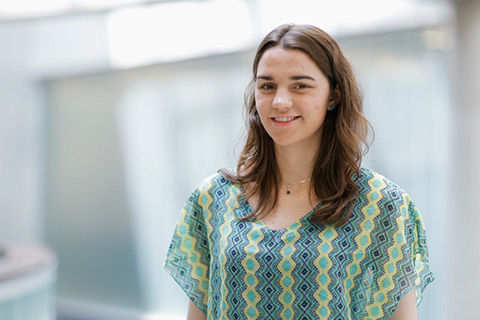For Jessica Phillips, it all started under water, six years ago, off the coast of Belize.
“There were sea turtles swimming under me, and reef sharks all around,” Phillips recalls. “It was a really pristine area, and the coral reefs were so beautiful. I thought there should be more places like this: undeveloped, the way they originated. I wanted to protect more species, more areas. That is how I became interested in wildlife biology.”
And this is how the native of Hong Kong started an academic career that led to her being named one of three 2016 Rhodes Scholars from the University of Toronto. “Jessica Phillips will be following in the footsteps of prior UC Rhodes Scholars, such as former U of T president David Naylor and former Ontario premier Bob Rae,” says University College principal Donald Ainslie. “And the research she does at Oxford on climate change will continue the UC tradition of using academic studies to make the world a better place.”
The other two undergrads who will be attending the University of Oxford as Rhodes Scholars next October are James Flynn, a political science and economics major at Trinity College, and Kaleem Hawa, who studied international relations and global health at Trinity. All three received their U of T degrees during Convocation ceremonies in June.
Phillips, 22, will pursue a DPhil – the Oxonian PhD – in zoology at Merton College. During her BSc studies at U of T, she specialized in ecology and evolutionary biology, with a major in biodiversity and conservation and a minor in psychology. Her particular interest is the Antarctic – specifically, in protecting it. “The ecosystem is fragile,” she says. “Development can have drastic consequences. Species could interact with the effects of climate change.”
She expects her sojourn in Oxford to include a field trip to Antarctica to study gentoo, chinstrap and emperor penguins and observe how reduced ice cover and increased fishing affect their distribution and ability to thrive.
Phillips was raised mostly in Beijing; she is the daughter of psychiatrists practising in central China. She is also accustomed to travel: by her second year at the University of Toronto, she was working with Prof. Martin Krkosek at the Salmon Coast Field Station off Vancouver Island. Last summer, Phillips was involved in the study of subarctic hummingbirds in Churchill, Manitoba.
Although she spoke English at home – her father is Canadian, her mother American – Phillips was schooled in Mandarin until she was 16, when she enrolled in an international school in Shanghai. “I wanted to start learning scientific terms in English,” she says, “so it would be a less difficult transition.” Phillips has maintained her links to China as a member of the U of T Mandarin Debate Association.
A university as diverse as U of T was a perfect place for Phillips. But it was the academic environment that made the biggest difference. “My time at U of T has helped me identify my passion and given me the means to pursue it,” she says.





